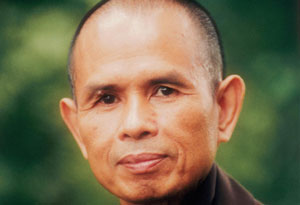A Conversation with Thich Nhat Hanh About Savor

Photo: Nan Sao
World-renowned Buddhist master Thich Nhat Hanh has teamed up with nutritionist Dr. Lilian Cheung to change the way we eat with their book Savor: Mindful Eating, Mindful Living. Get his take on the root of our weight problems, what he eats every day and how to change your own eating habits forever.
Why did you choose to write a book on eating and mindfulness now?This is an unprecedented time in history. Globally, there are more people who are overweight than who are hungry and underweight. Scientists have already warned us that if the overweight and obesity trend is not turned around, this generation of youth will have a lifespan shorter than their parents.
Moreover, being overweight increases the risk of many serious health problems. These problems cause much suffering, affecting the individuals who have these diseases as well as their family members. On a large scale, such suffering affects the well-being of our societies and our world as a whole. The root of our problem lies in what we consume—not just food, but other elements that contribute to who and what we are. There is much to draw from the Buddha's teachings on mindfulness to gain insight on this contemporary obesity epidemic. Mindfulness practices enhance the connection between our body, our mind and everything else that is around us. Mindful living is the key to understanding our struggles with weight and to empowering us to control our weight. The opportunity to engage more people to learn about mindful living, to achieve joy and peace, is now.
What role does mindful eating play in your everyday life?
When we can slow down and really enjoy our food, our life and our health, we take on a much deeper quality. I love to sit and eat quietly and enjoy each bite, aware of the presence of my community, aware of all the hard and loving work that has gone into my food. When I eat in this way, not only am I physically nourished, I am also spiritually nourished. The way I eat influences everything else that I do during the day. If I can look deeply into my food and take this time as a meditation—just as important as my sitting or walking meditation time—I receive the many gifts of the cosmos that I would not otherwise profit from if my mind were elsewhere. Because if I eat and am consumed by my worries and projects, I am eating a lot of stress and fear and this is harmful to my body and mind. We have a gatha, or verse, that we recite while eating:
In the dimension of space and time,What does the daily menu at Plum Village look like?
We chew as rhythmically as we breathe.
Maintaining the lives of all our ancestors,
opening an upward path for descendants.
So when we eat mindfully we can be in direct contact with our ancestors as well as our descendants and use the time of eating to see how we can nourish the best things our ancestors have passed onto us and how to continue to transmit what is most precious to future generations.
We enjoy a delicious vegan diet, and many of our grains are organic. For breakfast we eat oatmeal, homemade bread, homemade nut or bean spreads, fruit, nuts and sometimes Vietnamese noodle soup or sticky rice. For lunch we have rice, a stir-fry vegetable dish, a tofu or bean dish, a soup, steamed vegetables or salad and occasionally dessert. The Vietnamese desserts are usually a sweet soup with beans or grains, and the Western desserts are vegan pies, cakes or cookies. For dinner we eat a light and simple meal of rice or noodle soup and vegetables.



